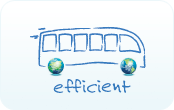|
"We can make mobility affordable while at the same time saving the climate", claimed Michael Cramer, Green spokesperson for transport policy in the European Parliament.
A new study by Dr. Udo Becker (professor for transport economics at the Technical University of Dresden) was also published this month, showing that car traffic in the EU causes high uncovered costs that are not reflected in market prices.
The study finds that every car in the EU creates uncovered costs of 1,600 EUR per year. The annual total for the EU-27 amounts to 373 billion EUR, the equivalent of 3% of the EU's GDP. Given the average life span of cars in the EU of 10 years, every car generates external costs of 16,000 EUR over its lifecycle. These costs mainly result from accidents (41%) and climate change (37%).
"Car use, while beneficial to citizens, also creates huge costs, which are only partially covered by car users. The remaining costs (noise, pollution, accidents and climate change) have to be borne by other citizens, other regions or future generations. This leads to inefficient mobility choices", said Mr Cramer.
Read the FNAUT’s report (in French)
See the video presentation of the University of Dresden report
|














